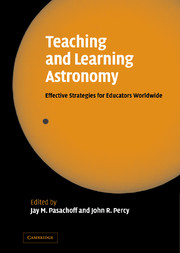Book contents
- Frontmatter
- Contents
- List of illustrations
- Preface
- Introduction
- Part I Astronomy in the curriculum around the world
- Part II Astronomy education research
- Part III Educating students
- Part IV Educating teachers
- Part V Astronomy and pseudoscience
- Part VI Astronomy and culture
- Introduction
- 14 Teaching astronomy in other cultures: archeoastronomy
- Poster highlights
- Part VII Astronomy in developing countries
- Part VIII Public outreach in astronomy
- Part IX The education programs of the International Astronomical Union
- Part X Conclusions
- Author index
- Subject index
Introduction
Published online by Cambridge University Press: 18 May 2010
- Frontmatter
- Contents
- List of illustrations
- Preface
- Introduction
- Part I Astronomy in the curriculum around the world
- Part II Astronomy education research
- Part III Educating students
- Part IV Educating teachers
- Part V Astronomy and pseudoscience
- Part VI Astronomy and culture
- Introduction
- 14 Teaching astronomy in other cultures: archeoastronomy
- Poster highlights
- Part VII Astronomy in developing countries
- Part VIII Public outreach in astronomy
- Part IX The education programs of the International Astronomical Union
- Part X Conclusions
- Author index
- Subject index
Summary
Astronomy is deeply rooted in almost every culture, as a result of its practical applications and philosophical implications. Nowadays, we determine time, date, and direction from clocks, calendars, compasses, and global positioning system (GPS) signals from the sky. In earlier times, these were determined by direct observation of the sky. Even today, the Islamic month and new year are based on direct observation, not on a calendar prepared in advance. One of us (JRP) lives and teaches in the most multicultural city in the world - Toronto. There, a large fraction of students come from Asian cultures that set their calendar by the sun and/or moon. The other (JMP) comes from another multicultural city, New York, where the lunar Jewish calendar still resonates in a large fraction of the population. The Christian calendar also approved by and named after Pope Gregory XIII in 1582, now often called 1582 CER (Common Era) but formerly ad (Anno Domini) 1582, also has many astronomical connections, and students may be interested to learn about these.
The connection between astronomy and religion, of course, can be problematic. In Part V, we included creationism under the heading of pseudoscience. But astronomy and religion need not conflict. Our astronomical colleagues in the Vatican Observatory are both astronomers and Jesuits. Over the years, they have developed a deep understanding of the possible relationships between science and religion, while maintaining a first-class astronomy research program (and a major collection of meteorites). Nevertheless, many humans are deeply influenced by their belief and faith in their religions, as well as by their culture. Many issues can be introduced through the history of astronomy.
Information
- Type
- Chapter
- Information
- Teaching and Learning AstronomyEffective Strategies for Educators Worldwide, pp. 179 - 180Publisher: Cambridge University PressPrint publication year: 2005
